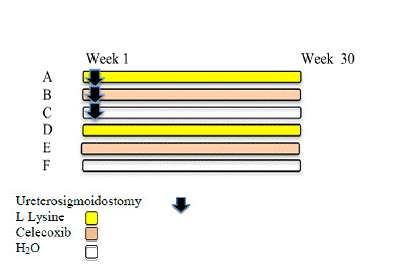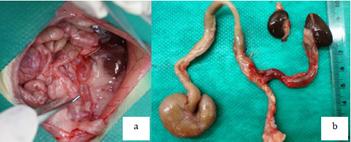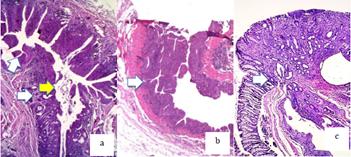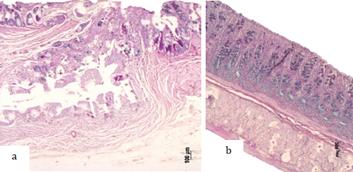ABSTRACT
PURPOSE:
To evaluate the effects of L-lysine on the intestinal and urothelial epithelium of rats subjected to ureterosigmoidostomy (new model for surgical carcinogenesis).
METHODS:
Forty-two rats, 9 weeks of age, were divided into 6 groups. Animals in groups A, B, C were subjected to ureterosigmoidostomy (US) and treated with L-lysine, celecoxib and H2O, respectively. Groups D, E and F (non-operated controls) received L-lysine, celecoxib and H2O, respectively. The L-lysine dose was 150 mg/kg and that of celecoxib was 20 mg/kg. The colon was analyzed for the presence of aberrant crypt foci (ACF) under a stereomicroscope.The tissue was stained with hematoxylin and eosin and PAS alcian blue.
RESULTS:
There were rare ACF, and there was no statistically significant difference between the groups. Histopathologic study of the ureteral epithelium identified moderate to severe urothelial hyperplasia in rats with ureterosigmoidostomy. Transitional hyperplasia in the ureters of animals receiving L-lysine (A) showed an apparent difference compared to the control (C) (P=0.2424). There was no dysplasia or atypia
CONCLUSION:
L-lysine does not promote carcinogenesis of the intestinal and urethelial epithelium of rats subjected to ureterosigmoidostomy at the doses and times studied.
Key words:
Urinary Diversion; Carcinogenesis; Lysine; Rats

 Thumbnail
Thumbnail
 Thumbnail
Thumbnail
 Thumbnail
Thumbnail
 Thumbnail
Thumbnail
 Thumbnail
Thumbnail
 Thumbnail
Thumbnail





